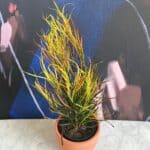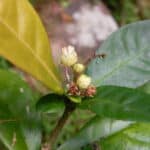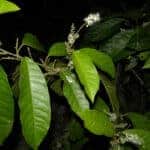Did you know the Croton plant is one of the most prized Feng Shui plants, which makes excellent houseplants that clean indoor air?
However, these tropical species are not very cold-hardy and may die at low temperatures.
Read on to find out some of the most suitable Croton varieties with their care tips!
Table of Contents Show
How Many Croton Varieties Are There?
Croton (Codiaeum variegatum) is an evergreen shrub commonly known as garden Croton.
Belonging to the Euphorbiaceae family, it boasts over 100 varieties in many tropical and sub-tropical belts in Asia and Pacific regions.
Some species may boast single colors ranging from green, red, ivory, orange, copper, pink, and brown to a decadent splash of colors.
Depending on the species, some Croton will grow in full sun outside while others require partial shade and are best kept indoors, where a mature Croton plant may grow 3-8 feet tall and 3-6 feet wide.
The plants are evergreen with glossy and leathery leaves that retain color when exposed to bright sunlight but fail to grow flowers when grown indoors.
Many interior decorators recommend this plant for its Feng Shui properties, which create balance and harmony.
The Croton leaves are known to cleanse indoor air of toxins like benzene and ammonia and boost oxygen levels.
24+ Croton Varieties with Names & Pictures
Some Croton varieties are dwarf, while others may get tall as a vining plant. Moreover, not all Crotons produce blossoms.
Here is a list of some of the best Croton plants.
1. Gold Dusted Croton
Gold Dusted Croton (Codiaeum variegatum) is a popular Croton houseplant hailing from the tropical forests of Indonesia.
When grown in an ideal condition, it will grow up to 3-6 feet in length, whereas those found in the natural habitat may grow up to 10 feet (3 meters).
Gold Dusted Croton boasts vividly green leaves with yellow specks and year-round blossoms that appear in long clusters between big leaves.

You could quickly identify the plant by its gold-specked leaves, measuring 2-3″ long and an inch wide with showy white-colored flowers.
However, achieving blossoms in an indoor-grown plant can be relatively tricky.
2. Zanzibar Croton
Zanzibar Croton (Codiaeum variegatum Zanzibar) boasts narrow leaves with colors ranging from green to purple, red, yellow, and orange.
It looks almost like grass with its slender and long leaves and hardly resembles Croton cousins with broad leaves.
They produce slender long shoestring-like leaves displaying a wide range of colors, which will evolve as they mature.
Hailing from the tropical Western Pacific islands, including Australia, Malaysia, and Indonesia, they prefer bright sunlight with a warm temperature and ample humidity.

The mature Zanzibar Croton may reach a height of 6 feet (1-1.8 meters) and attain a width of 3-4 feet (1 meter) when cared for.
However, it is not known to produce flowers in any environmental condition.
3. Yellow Iceton Croton
Though Yellow Iceton Croton (Codiaeum variegatum ‘Yellow Iceton) is marked as a rare Croton species in the market, they are widely available among exotic plant sellers.
It shows off mid-green foliage with yellow and green variegation, with some achieving over 90% yellow color.
However, a mature Yellow Iceton Croton may only reach up to 3-4 feet tall, but what it does not provide in height compensates with bushier variegated growth.
It is known for its unusual foliage color and evergreen variegation, making it a prized Croton plant, but it is not known to flower.
You can grow them both as indoor and outdoor plants.
4. Victoria Gold Bell Croton
Victoria Gold Bell Croton (Codiaeum ‘Victoria Gold Bell’) boasts a distinct leaf structure with a grassy form shaped like the bell at the end.
However, a well-grown Bell Croton may hardly achieve a height above a foot.
Hailing from tropical Southeast Asia, it grows well in areas with warmer climates (USDA 9 or above.)
It does not grow taller but will grow out bushier grassy foliage with beautiful leaves in orange, yellow, purple, green, and red, making a magnificent ornamental plant.
Victoria Gold Bell can hardly get over 4 ft, whereas a mature plant can only get 3-3.5 ft tall.
Victoria Gold Bell Croton is not known to produce blossoms though.
5. Yellow Thai Croton
Yellow Thai Croton (Codiaeum variegatum) is a rare Croton plant that boasts broad leaves with various colors, such as red, yellow, orange, and pink.
Hailing from the tropical forests of Southeast Asia and Australia, Yellow Thai Croton demands a warm temperature and ample bright light to attain maximum colorful leaves.
Moreover, it is an easy-to-grow plant that does well in average household conditions but would not grow taller.
Remember, significant exposure to low light will revert the leaves to green, which you would not want.
6. Croton (Rare Thai)
As the name suggests, Croton Rare Thai is one of the rare Croton species sold only through a handful of exotic plant sellers.
It resembles Thai Round Leaf Croton in appearance with round, colorful leaves.
You would mostly find the prevalence of red and yellow on the leaves, which will increase with an ample supply of bright light.

It will thrive with the proper growing condition but may fail to achieve tall height or blossoms.
7. Thai Round Leaf Croton
Did you know the Croton plant is known as ‘Gro Son’ in Thailand?
Thai Round Leaf Croton is originally known as the Round leaf Croton, but it was later renamed Thai Round Leaf due to its popularity in Thailand.
The plant was hybridized to create a more round leaf Croton as the Thai prefer the latter.
This hybrid plant boasts small, round leaves with bright yellow and red variegation, which you can quickly identify from a distance.
A mature plant in the wild can become 10 feet tall, but most domesticated species are known to be dwarf Crotons.
8. Red Iceton Croton
The Red Iceton Croton (Codiaeum variegatum ‘Mrs. Iceton‘) is a gorgeous Croton species that rewards you with fantastic colored leaves and variegation.
It primarily produces yellow leaves that mature in shades of red and pink hues. The deep, bright veins run throughout the leaf.
When the growing conditions are ideal, they attain a height of 7-8 feet and boast glossy mid-green leaves with pointed tips.
The leaves are glossy, each with a vivid red, pink, yellow, or orange splash.
Consider placing the Red Iceton Croton atop the desk in the office or at home, but as indoor Croton, it will rarely flower.
9. Petra Croton
Petra Croton (Codiaeum variegatum ‘Petra’) is a gorgeous ornamental Croton species hailing from the tropical forests of Southeast Asia.
It features large, broad leaves with rich variegation of yellow, green, orange, bronze, and burgundy red.
A mature plant will grow up to 4-5 feet in length and boast glossy, oval-shaped leaves with point tips.
10. Oakleaf Croton
Oakleaf Croton (Codiaeum variegatum ‘Oakleaf’) is a tree-like Croton plant with large, tri-lobed leaves.
Each leaf may exhibit burgundy, red, green, orange, and yellow shades and grow up to 5-6 inches.
It is originally from Northern Australia and the Pacific Islands and thrives in semi-shaded locations.
Remember, this plant requires more sunlight and watering to maintain healthy-looking leaves and does well indoors and outdoors near a good light source.
It may grow up to 60 inches (1.5 meters) when provided with excellent care.
11. Sunny Star Croton
As the name suggests, Sunny Star Croton (Codiaeum variegatum ‘Sunny Star’) boasts large, elliptical light green leaves with a dash of gold near the base of the leaf.
The rich foliage mimics sun rays falling on the leaves, hence the name Sunny Star.
Originally from South Asia and Southeast Asia, it gets its name from its leaves that highlight specks of gold.

It will attain a height of 4-6 feet (1.5 meters) when grown in ideal indoor conditions.
12. Mrs. Iceton Croton
Mrs. Iceton Croton (Codiaeum variegatum ‘Mrs. Iceton’) is similar to Red Iceton Croton, where the latter is male.
Unlike Red Iceton, it displays light green leaves with shades of yellow, golden, orange, and red tones, with deep, bright veins running throughout the leaf.
Mrs. Iceton Croton also boasts glossy mid-green leaves with pointed tips. It may take a while to notice, but you can quickly determine it with an accurate description.
However, it may grow slightly shorter than Red Iceton and can only reach up to 3-6 feet tall.
13. Mother and Daughter Croton
Mother and Daughter Croton (Codiaeum variegatum ‘Mother and Daughter’) are among exotic Croton varieties that display long, narrow leaves with green to deep purple shade and a splash of yellow or ivory.
The Longleaf appears to hold another small leaflet at the end, the midrib of the leaf forming a second leaflet 1/3 of the length of the entire leaf.
The plant comes from the tropical forests of Southeast Asia and the Pacific regions.
The mature leaves span 8-15 cm long and 1-2 cm wide and make perfect ornamental plants but ensure comprehensive care.
14. Mammy Croton
Mammy Croton (Codiaeum variegatum ‘Mammy’) is a magnificent Croton that boasts large, leathery, multi-colored leaves with curled edges.
Providing optimal bright sunlight produces thick, glossy leaves with red, green, purple, and bright yellow shades.
When provided with excellent care, it will reach 2-3 feet and spread about 2 feet wide when grown in warm regions like USDA 11-12.
Each distinct leaf of Mammy Croton measures about 8″ long and an inch wide, with curled edge and elongated end.
15. Gold Star Croton
Gold Star Croton (Codiaeum variegatum ‘Gold Star’) is a refreshing Croton plant that displays narrow dark green leaves with shiny yellow splashes.
The yellow specks on the green leaf give an impression of a gold star.
Gold Star Croton has green leaves speckled with bright gold, giving an appearance of a constellation of stars.
Many growers may confuse it with sunny star Croton. Remember, it grows taller, and the leaves have larger gold specks, where they may get a few inches long and an inch wide.
However, they are easy-to-grow houseplants and may easily attain a height of 3-6 feet when provided with excellent care.
16. Lauren’s Rainbow Croton
Lauren’s Rainbow Croton (Codiaeum ‘Lauren’s Rainbow’) is a unique Croton plant that boasts a rich cluster of colors that may give an impression of a rainbow.
The striking, glossy foliage displays a bright range of colors, including yellow, orange, red, bronze, green, and purple.

Moreover, this flowering species will feature white star-shaped flowers from late winter to early spring.
When the plant matures, it will boast white-colored flowers that will bloom throughout the year.
17. Florida Select Croton
Florida Select Croton (Codiaeum variegatum ‘Florida Select’) is the boldest Croton species, which displays brilliantly colored foliage with bright yellow, orange, red, and even black.
This showy plant boasts smooth and medium-sized velvety leaves with deep yellow veins, best displayed in the dining and living rooms.
They enjoy slightly moist conditions, but too wet will invite sick-looking plants that begin shedding old leaves.
However, do not expect them to blossom, as it is pretty rare for indoor-grown Florida Select Crotons to flower.
18. Bush on Fire Croton
Bush on Fire Croton (Codiaeum variegatum ‘Bush on Fire’) is a relatively rare Croton plant due to less supply. It originally comes from the tropical island of Sri Lanka.
You may find these Croton varieties with red, orange, yellow, purple, and white variegation.
Many growers call Bush on fire Croton a “Picasso’s paintbrush” because it boasts thin leaves that resemble a paintbrush dipped in multiple colors.
You would know them by their leathery leaves colored in various shades.
However, the leaves may change with age, produce different colors, and produce large leaves with time.
19. Eleanor Roosevelt Croton
Eleanor Roosevelt Croton (Codiaeum variegatum var. pictum ‘Eleanor Roosevelt’) is a magnificent-looking Croton species from Indonesia and Eastern Pacific.
This beautiful Croton boasts narrow green leaves with large yellow specks. With time, it will begin displaying green to purple leaves sprinkled with golden-yellow hues.
When grown correctly, it will attain heights of up to 4-6 feet.
20. Banana Croton
Banana Croton (Codiaeum variegatum ‘Banana’) hails from the tropical regions of Pacific island, Malaysia, and Northern Australia.
Because of its wide nativity, it can be grown as indoor and outdoor plants year-round.
The best thing about Banana Croton is that you would find a variety of leaf shapes and colors all on the same plant.
Some leaves may have pointer ends, while others may boast blunt ends.
These Croton varieties boast lance-shaped green leaves splashed with banana-yellow shade.
It can grow up to 3-4 feet in an ideal growing condition and achieve narrow leaves that get 5-6″ long or more.
21. Andrew Croton
Andrew Croton (Codiaeum variegatum ‘Andrew‘) is a stunning Croton plant that shows off long, narrow leaves streaked in creamy white texture originating in Malaysia.
You can quickly identify them with their narrow leaves boasting creamy white streaks.
As it matures, the leaves will get longer, spanning over 3 inches. A developed Andrew Croton will reach up to 3-5 feet tall.

You can choose to grow them on hedges, walkways, or indoors!
22. Magnificent Croton
Magnificent Croton (Codiaeum variegatum ‘Magnificent’) is a beautiful Croton variety, thanks to its variegated foliage.
It originates from the tropical forests of Oceania and Southeast Asia.
A compact plant will hardly reach over 4 feet but will ensure large dark green-colored variegated leaves with beautiful pink, red, orange, bright yellow, and purple spots.
You can also grow it outdoors, where it will reach 5-10 feet but do not expect the same results indoors.
Additionally, it is not known to flower both indoors and outdoors.
23. Dwarf Corkscrew Croton
Dwarf Corkscrew Croton is much similar to the Mammy Croton plant, which will hardly reach over 3 feet.
However, it is among popular dwarf Croton varieties that boast brilliant-colored foliage and twisting leaves.
They originate from Malaysia and Eastern Pacific Rim, bringing rich hues of bright colors like red, green, yellow, and orange.
The narrow strapped leaves twist as they begin to grow, giving a unique outlook.
24. Croton Arrowhead
Croton Arrowhead, also known as Golden Arrowhead, is a beautiful Croton species that displays bright exotic golden leaves.
Known for its rich green and golden shade variegation, it is widely chosen as an ornamental plant.

Depending on the exposure to light, it will attain more or less golden shade than green and reach a height of 3 feet with dynamic wider growth.
The leaf is shaped like an arrowhead or duck foot; hence, the name arrowhead.
Additional Croton Varieties with Their Features
Here are a few more Croton species for avid gardeners.
| Croton Varieties | Features | Image |
|---|---|---|
| Dreadlocks Croton | 1. Deep dark green-colored 2. Curled and twisted leaf 3. Reaches 3-10 ft |  |
| Chocolate Caricature Jamaican Croton | 1. Dark green chocolate leaf 2. Hint of bronze and pastel 3. Reaches about 6 ft |  |
| Picasso’s Paintbrush Croton | 1. Narrow, grass-like leaves 2. Pastel colored leaves 3. Reaches 3-5 ft |  |
| Superstar Croton | 1. Bright green leaves with yellow splash 2. Reaches 3-5 ft |  |
| Croton hancei | 1. Shurb species with oblong-lanceolate leaf 2. Flowering species 3. Reaches 3m |  |
| Croton alabamensis | 1. Semi-deciduous shrub 2. Reaches 6 ft 3. Bright green leaf |  |
| Croton schiedeanus | 1. Boasts green leaves 2. An evergreen shrub |  |
Tips to Care for Croton Plants
Croton is an easy-to-care houseplant that grows well both indoors and outdoors.
Although a flowering plant, some Croton varieties may fail to blossom and only attain a miniature size appropriate for an ornamental plant.
A tropical plant requires a warm and humid environment to thrive. Your Croton plant will do well in USDA zones 11a-12b.
Here are a few proven tips for caring for the Croton plant.
- Croton prefers warm temperatures, ranging between 65°F to 85°. They will grow best in USDA Zones 9 to 12.
- Ensure to keep them in brightly lit areas such as an east or south-facing window, patio, and walkway.
- Provide 80-100% bright sunlight to boost leaf growth and signature variegation.
- Move the outdoor plant inside under the appropriate LED grow light when the temperature drops below 50°F and use relevant heat maps or a frost blanket.
- To prevent transpiration, use a room humidifier to maintain the humidity between 40-60%, especially in the growing season.
- Croton hates overwatering; hence, you should use a watering scheduling app to avoid the risk of overwatering the plant.
- Apply organic fertilizer with NPK ratio 3-1-2 or 8-2-10 every 3-4 weeks in the growing season. Some species may only require fertilizing once or thrice a year.
- Croton prefers moist, well-draining soil (houseplant soil, peat moss, and perlite) with a pH level between 4.5 to 6.5.
- Always use chlorine-free, tepid water to avoid the risk of chemical buildup in the soil.
- Keep pruning to spring and summer and remove old, decayed leaves, leggy stem growth, and spent flowers.
- Avoid overhead watering the plant and remove it from damp, moist places to avoid the risk of fungal and bacterial infestation (Anthracnose, Bacterial leaf spot, and stem gall).
- Only outdoor-grown Crotons will achieve blossoms that too in an ideal growing condition.
Quench your queries regarding Croton flower!
From Editorial Team
Croton makes a perfect ornamental plant to have around the house or office.
The colorful foliage boasts rich variegations and often changes color, which symbolizes positive change.
Croton varieties do great in the home environment and easily withstand some negligence. Some Croton species will also display blossoms year-round.
